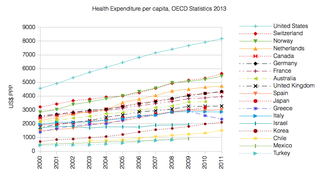Related Research Articles
Aetna Inc. is an American managed health care company that sells traditional and consumer directed health care insurance and related services, such as medical, pharmaceutical, dental, behavioral health, long-term care, and disability plans, primarily through employer-paid insurance and benefit programs, and through Medicare. Since November 28, 2018, the company has been a subsidiary of CVS Health.

Workers' compensation or workers' comp is a form of insurance providing wage replacement and medical benefits to employees injured in the course of employment in exchange for mandatory relinquishment of the employee's right to sue his or her employer for the tort of negligence. The trade-off between assured, limited coverage and lack of recourse outside the worker compensation system is known as "the compensation bargain.” One of the problems that the compensation bargain solved is the problem of employers becoming insolvent as a result of high damage awards. The system of collective liability was created to prevent that and thus to ensure security of compensation to the workers.

AARP is an interest group in the United States focusing on issues affecting those over the age of fifty. The organization said it had more than 38 million members in 2018. The magazine and bulletin it sends to its members are the two largest-circulation publications in the United States.
Health insurance or medical insurance is a type of insurance that covers the whole or a part of the risk of a person incurring medical expenses. As with other types of insurance, risk is shared among many individuals. By estimating the overall risk of health risk and health system expenses over the risk pool, an insurer can develop a routine finance structure, such as a monthly premium or payroll tax, to provide the money to pay for the health care benefits specified in the insurance agreement. The benefit is administered by a central organization, such as a government agency, private business, or not-for-profit entity.
Universal health care is a health care system in which all residents of a particular country or region are assured access to health care. It is generally organized around providing either all residents or only those who cannot afford on their own, with either health services or the means to acquire them, with the end goal of improving health outcomes.

The Cigna Group is a for-profit American multinational managed healthcare and insurance company based in Bloomfield, Connecticut. Its insurance subsidiaries are major providers of medical, dental, disability, life and accident insurance and related products and services, the majority of which are offered through employers and other groups. Cigna is incorporated in Delaware.
Single-payer healthcare is a type of universal healthcare in which the costs of essential healthcare for all residents are covered by a single public system.

Axa S.A. is a French multinational insurance company headquartered in the 8th arrondissement of Paris. It also provides investment management and other financial services.

The healthcare in Switzerland is universal and is regulated by the Swiss Federal Law on Health Insurance. There are no free state-provided health services, but private health insurance is compulsory for all persons residing in Switzerland.
In the United States, health insurance helps pay for medical expenses through privately purchased insurance, social insurance, or a social welfare program funded by the government. Synonyms for this usage include "health coverage", "health care coverage", and "health benefits". In a more technical sense, the term "health insurance" is used to describe any form of insurance providing protection against the costs of medical services. This usage includes both private insurance programs and social insurance programs such as Medicare, which pools resources and spreads the financial risk associated with major medical expenses across the entire population to protect everyone, as well as social welfare programs like Medicaid and the Children's Health Insurance Program, which both provide assistance to people who cannot afford health coverage.

Healthcare in Singapore is under the purview of the Ministry of Health of the Government of Singapore. It mainly consists of a government-run publicly funded universal healthcare system as well as a significant private healthcare sector. Financing of healthcare costs is done through a mixture of direct government subsidies, compulsory comprehensive savings, a national healthcare insurance, and cost sharing.

In the United States, health insurance coverage is provided by several public and private sources. During 2019, the U.S. population overall was approximately 330 million, with 59 million people 65 years of age and over covered by the federal Medicare program. The 273 million non-institutionalized persons under age 65 either obtained their coverage from employer-based or non-employer based sources, or were uninsured. During the year 2019, 89% of the non-institutionalized population had health insurance coverage. Separately, approximately 12 million military personnel received coverage through the Veteran's Administration and Military Health System.

The Affordable Care Act (ACA), formally known as the Patient Protection and Affordable Care Act and colloquially known as Obamacare, is a landmark U.S. federal statute enacted by the 111th United States Congress and signed into law by President Barack Obama on March 23, 2010. Together with the Health Care and Education Reconciliation Act of 2010 amendment, it represents the U.S. healthcare system's most significant regulatory overhaul and expansion of coverage since the enactment of Medicare and Medicaid in 1965.
Healthcare in the United States is subject to far higher levels of spending than any other nation, measured both in per capita spending and as a percentage of GDP. Despite this, the country has significantly worse healthcare outcomes when compared to peer nations. The U.S. is the only developed nation without a system of universal healthcare, with a significant proportion of its population not carrying health insurance.

The Egyptian healthcare system is pluralistic, comprising a variety of healthcare providers from the public as well as the private sector. The government ensures basic universal health coverage, although private services are also available for those with the ability to pay. Due to social and economic pressures, Egypt's healthcare system is subject to many challenges. However, several recent efforts have been directed towards enhancing the system.

Healthcare in Rwanda was historically of poor quality, but in recent decades has seen great improvement. Rwanda operates a universal health care system, and is considered to have one of the highest-quality health systems in Africa.

Healthcare in Slovakia has features of the Bismarck, the Beveridge and the National Health Insurance systems. Compulsory healthcare contributions, which are income-related, are paid to the chosen health insurance company. 4% is paid by the employee and 10% by the employer. Self-employed people have to pay all 14%. The government pays in respect of those not working, at a rate of 4.9% of average income. More than 98% of the population is covered by health insurance. There are three health insurance companies, one owned by the government which insures 65% of the population. Entitlement to treatment is not affected by the level of contributions. The system does not cover plastic surgery or all dental treatment. What is covered by health insurance is specified in legislation. The full cost of medication is not always covered.

Ayushman Bharat Pradhan Mantri Jan Arogya Yojana(PM-JAY) is a national public health insurance scheme of the Government of India that aims to provide free access to health insurance coverage for low income earners in the country. Roughly, the bottom 50% of the country qualifies for this scheme. People using the program access their own primary care services from a family doctor and when anyone needs additional care, PM-JAY provides free secondary health care for those needing specialist treatment and tertiary health care for those requiring hospitalization.
Health standards have greatly improved throughout the Bahamas in recent years. New hospitals and healthcare facilities have opened in Nassau and Grand Bahama. These healthcare facilities have also lowered the price of care for their residents. In comparison to the United States, the cost of a procedure in the Bahamas is about 30-40% less. Still, there are high levels of health and economic inequality and most of the population are unable to obtain private health insurance. Catastrophic spending on healthcare has bankrupted many patients and their families.
References
- ↑ "NHI consultation period with stakeholders extended". EyeWiness News. 15 November 2018. Retrieved 15 November 2018.